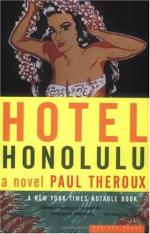|
This section contains 3,405 words (approx. 12 pages at 300 words per page) |

|
SOURCE: Wheeler, Edward T. “What the Imagination Knows: Paul Theroux's Search for the Second Self.” Commonweal 121, no. 10 (20 May 1994): 18–22.
In the following essay, Wheeler provides an overview of Theroux's travel writing and fiction, drawing attention to recurring themes and preoccupations that link his work in both genres, including his use of fictional doubles.
At the close of his best-selling travel book, The Great Railway Bazaar (1975), Paul Theroux reflects that “… the difference between travel writing and fiction is the difference between recording what the eye sees and discovering what the imagination knows. Fiction is pure joy. …” In emphasizing recording and discovering, in making fidelity to the truth a standard for the writer, Theroux has obligingly provided a way of discussing his own work. He is a realist in the same sense that painters are representational; he offers us something recognizably human and does not disrupt fictional conventions in doing this...
|
This section contains 3,405 words (approx. 12 pages at 300 words per page) |

|


